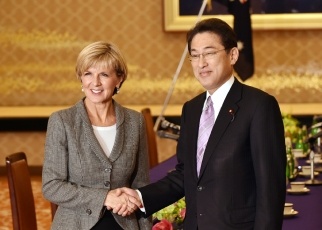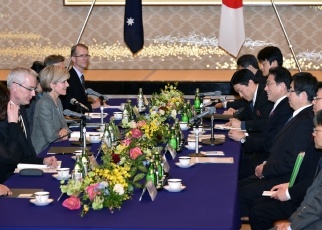Press Releases
Japan-Australia Foreign Ministers’ Meeting


On February 15, Mr. Fumio Kishida, Minister for Foreign Affairs of Japan, held a Japan-Australia Foreign Ministers’ Meeting and working dinner with the Hon. Julie Bishop, MP, Minister for Foreign Affairs of Australia. The overview of the meeting and dinner is as follows.
1. Overall
The two foreign ministers concurred to proceed with further cooperation in a wide range of areas based on the “special relationship” between Japan and Australia, which was reconfirmed by Mr. Shinzo Abe, Prime Minister of Japan, and the Hon. Malcolm Turnbull, MP, Prime Minister of Australia, on the occasion of the working visit of Prime Minister Turnbull to Japan in December 2015.
2. Bilateral relations
(1) The two foreign ministers exchanged opinions on cooperation in the areas including the economy, security and defense and concurred to further strengthen cooperation in relation to swiftly bringing TPP into force, the areas of security and defense, and innovation. In addition, they also exchanged opinions on Japan’s cooperation on the Australia’s submarine program.
(2) The two foreign ministers welcomed the 40th anniversary of the signing of the Basic Treaty of Friendship and Co-operation between Japan and Australia. Minister Kishida highly evaluated Australia’s New Colombo Plan, and stated that Japan would make efforts to stimulate people-to-people exchanges.(3) In relation to the activities of Sea Shepherd, Minister Kishida reiterated Japan’s request that Australia, as its vessel’s port state, take necessary measures against their extreme acts of sabotage and violent behavior.
3. Cooperation in the international arena
The two foreign ministers concurred to cooperate in further strengthening efforts by the international community for nuclear disarmament and non-proliferation, United Nations Security Council (UNSC) reforms, and other initiatives.
4. Regional cooperation and the international situations
(1) The foreign ministers strongly condemned North Korea’s launch of a ballistic missile, which it calls a “satellite,” following a nuclear test as actions that undermined the peace and security of the region and the international community, and concurred to cooperate with various countries for adoption of a strong UNSC resolution. They also shared the importance of presenting human rights issues, including the abductions issue, to the international community.
(2) The foreign ministers exchanged opinions on situations related to China (including the South China Sea and the East China Sea), the Middle East, and other regions, in addition to the topic of regional cooperation.
(3) The foreign ministers welcomed the settlement of the Australia-Japan Strategy for Cooperation in the Pacific (PDF) aimed at promoting specific cooperation between the two countries in the Pacific region.
aimed at promoting specific cooperation between the two countries in the Pacific region.
(4) The foreign ministers also concurred to promote multilateral cooperation through means including the East Asia Summit (EAS) and Japan-Australia-US and Japan-Australia-India trilateral relations for the purpose of promoting peace and prosperity in the Asia-Pacific region.

